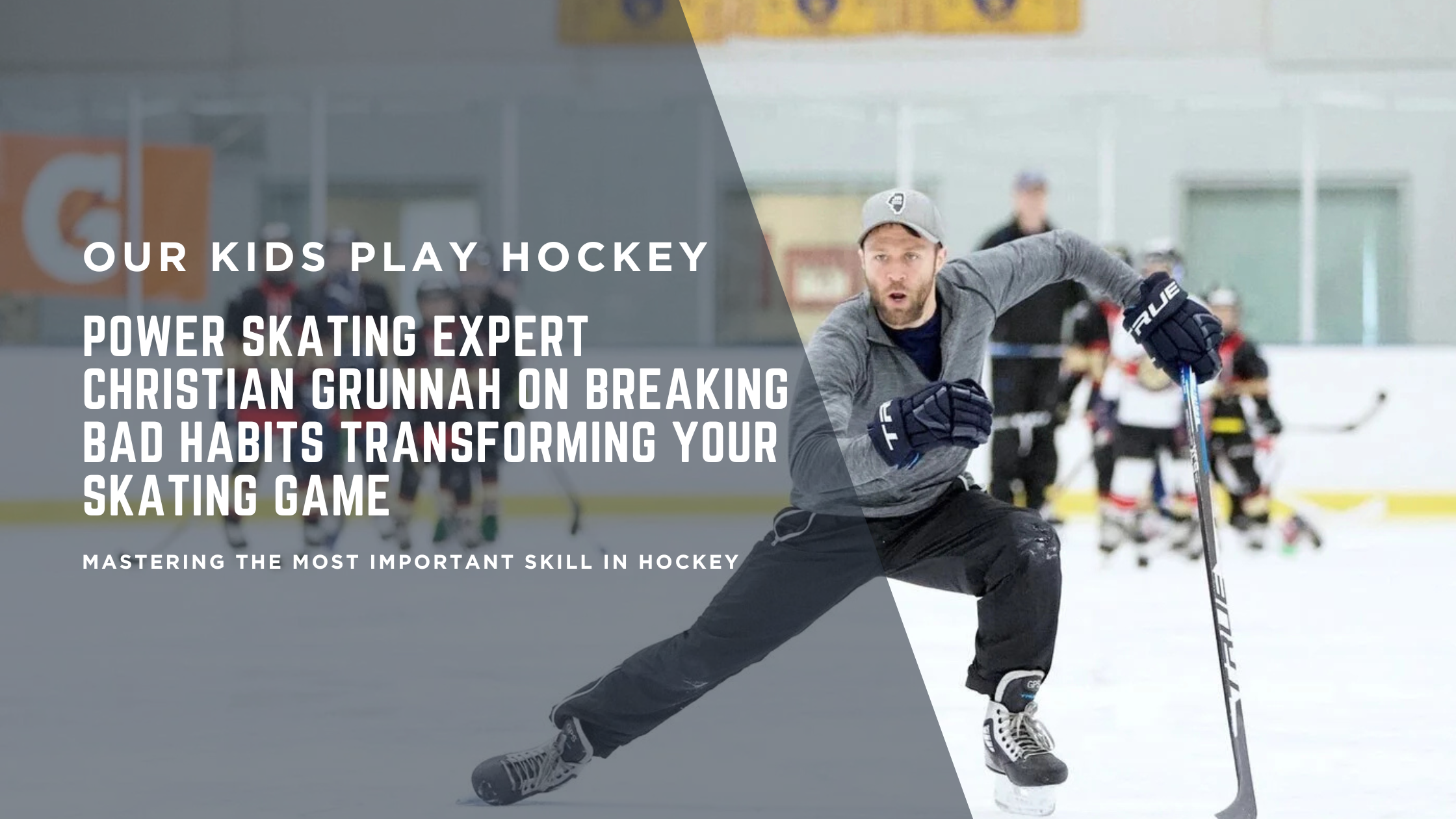Power Skating Expert Christian Grunnah on Breaking Bad Habits Transforming Your Skating Game

Skating isn’t just another hockey skill—it is the skill. That’s the message Christian Grunnah, founder of GRA Power Skating, brings to the ice in this episode of Our Kids Play Hockey. A national leader in skating development, Christian has trained players from beginners to NHL draft picks, and his insights are essential for parents, coaches, and players looking to gain a true edge.
Why Skating Matters More Than You Think
Skating is the foundational skill that determines how well a player can perform every other aspect of the game. As Christian puts it, "If we don't have all those little details and tools available to us, it's going to catch up to you pretty quick."
Key reasons skating is crucial:
-
It's the method of movement in hockey—without it, nothing else works.
-
The game demands efficiency and edge control, not just speed.
-
Skating intelligence creates time and space, even in high-pressure moments.
What Is Power Skating, Really?
The term "power skating" may sound intimidating, but it simply refers to mastering the edges, balance, and biomechanics that produce efficient, confident movement on the ice. Christian credits pioneers like Laura Stamm for bringing the term to hockey from figure skating, but emphasizes that today, power skating is a uniquely hockey-specific discipline.
His approach focuses on:
-
Understanding when and how to use each edge.
-
Building efficient mechanics tailored to a player's individual body.
-
Developing control, balance, and hockey IQ simultaneously.
When Should Kids Start Power Skating?
According to Christian, the magic window often starts around ages 7-9. But it’s not about physical strength—it’s about mind-body connection.
Development stages by age:
-
Under 7: Focus on fun, games, and exploring movement. Keep it playful.
-
7-9: Begin introducing edge work and technique. Kids at this age can start focusing and self-correcting.
-
10 and up: More advanced concepts, repetition, and technical refinement.
Christian emphasizes that skating should be taught with relatable drills, not just cones and commands. Kids learn best when they understand the why behind a movement—not just being told what to do.
Dealing with "Skating is Torture!"
Many kids resist skating drills because they’re hard. That’s not a sign to quit—it’s a sign of growth. Parents can help shift the narrative from punishment to purpose.
Tips for parents:
-
Explain how better skating helps them score more and defend better.
-
Use game footage to show where skating skills made the difference.
-
Avoid vague feedback like "move your feet" or "skate harder."
Instead, focus on how to skate smarter. As Christian says, "The beauty of our game is that our surface allows us to move without moving our feet."
Skating Intelligence: Race, Battle, Space
Christian breaks down hockey into three modes: Race, Battle, Space.
-
Race for the puck.
-
Battle your opponent.
-
Find Space to make a play.
Without solid skating, kids can't win the race—and they won’t reach the next steps. At elite levels, just half a second of space makes all the difference. Players like Connor McDavid and Nathan MacKinnon don’t just "skate fast" — they skate smart, using timing, angles, and edge control to dominate.
Breaking Bad Habits Takes Time
Short strides, heads down, and soft cores are common habits that slow players down. Christian uses video feedback and biomechanical awareness to help kids feel what correct technique actually feels like.
His go-to cues? "Eyes up. Button up." Meaning: keep your gaze forward and your core engaged. It's more effective than generic instructions like "chest up."
What to Look for in a Power Skating Program
Not all skating clinics are created equal. Christian warns parents to watch for red flags:
Avoid clinics that:
-
Have more than 30 kids on the ice.
-
Don’t explain the why behind drills.
-
Lack visual demonstrations from capable skaters.
-
Focus too much on cones instead of gameplay application.
Instead, seek out programs that emphasize both technical precision and game relevance. Kids should learn how skills translate directly into gameplay.
Goalies Need Skating, Too
Goalies aren’t exempt! Christian emphasizes that goalies should develop edge control and skating comfort from a young age. Their movement is unique and requires its own attention.
Final Word: Fun Comes From Confidence
At the end of the day, it’s not about creating the next NHL superstar. It’s about helping kids enjoy the game. As Christian says, "Fun comes in confidence. If we're not confident, how are we going to have fun?"
Investing in skating isn't just about being fast—it's about making the game more enjoyable, more accessible, and more rewarding.
Want to help your child become a more confident, capable skater? Share this episode with your team or download it for your next road trip.
And don’t forget to check out Christian’s work at GPS Hockey and follow him on Instagram at @powerskating.
Until next time, keep skating—and keep having fun!
Subscribe to Our Kids Play Hockey for more great conversations like this one.


